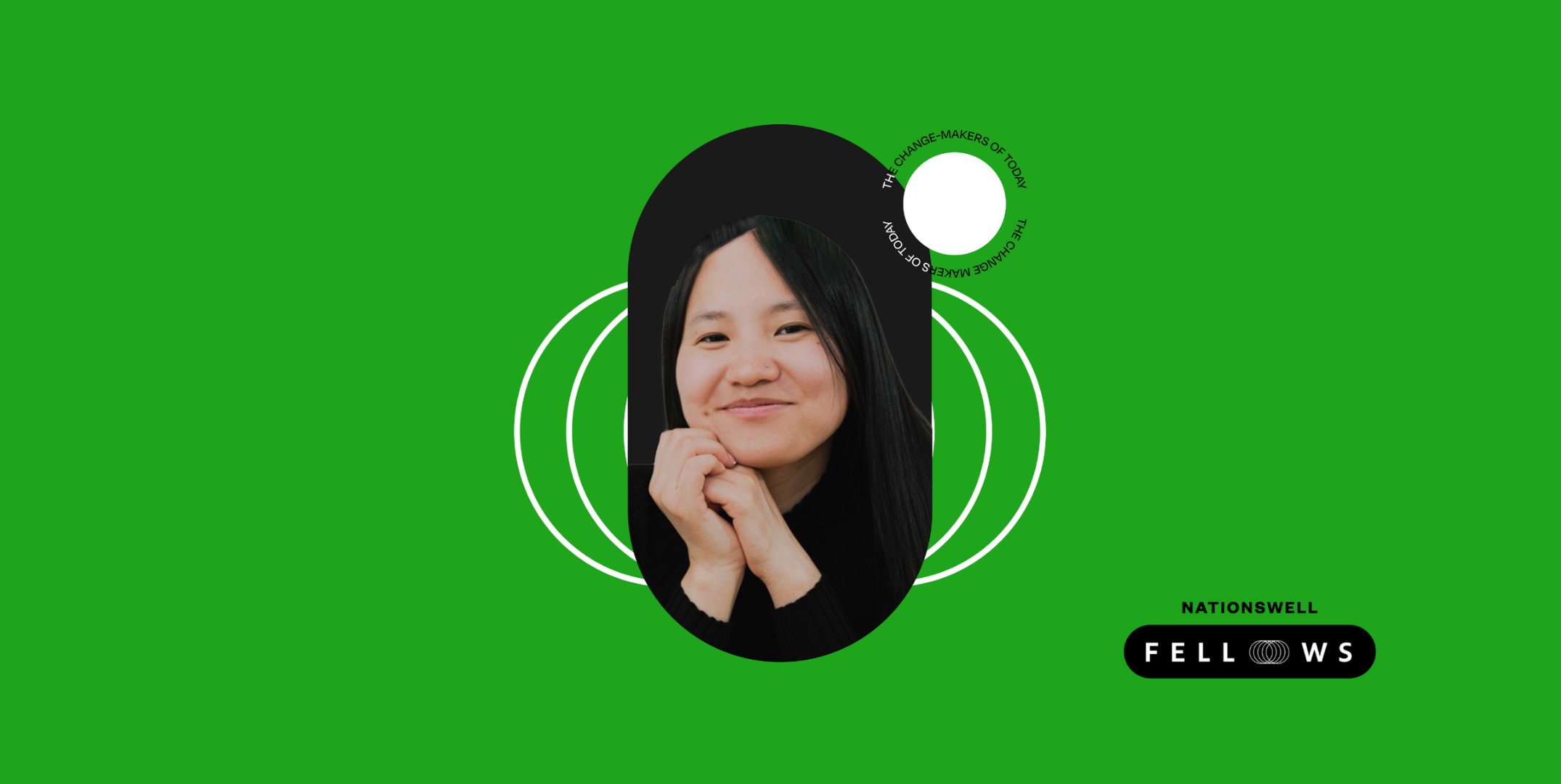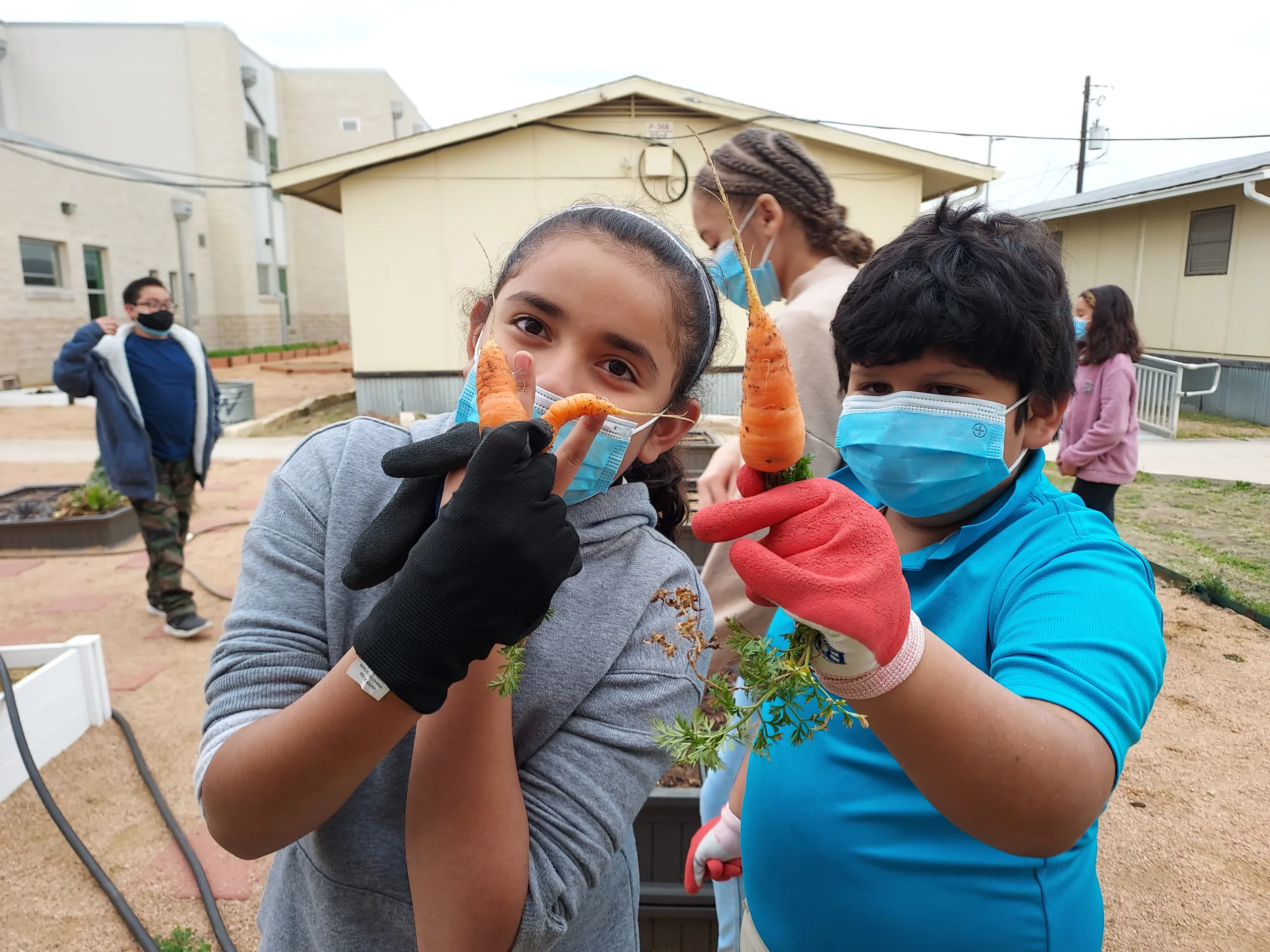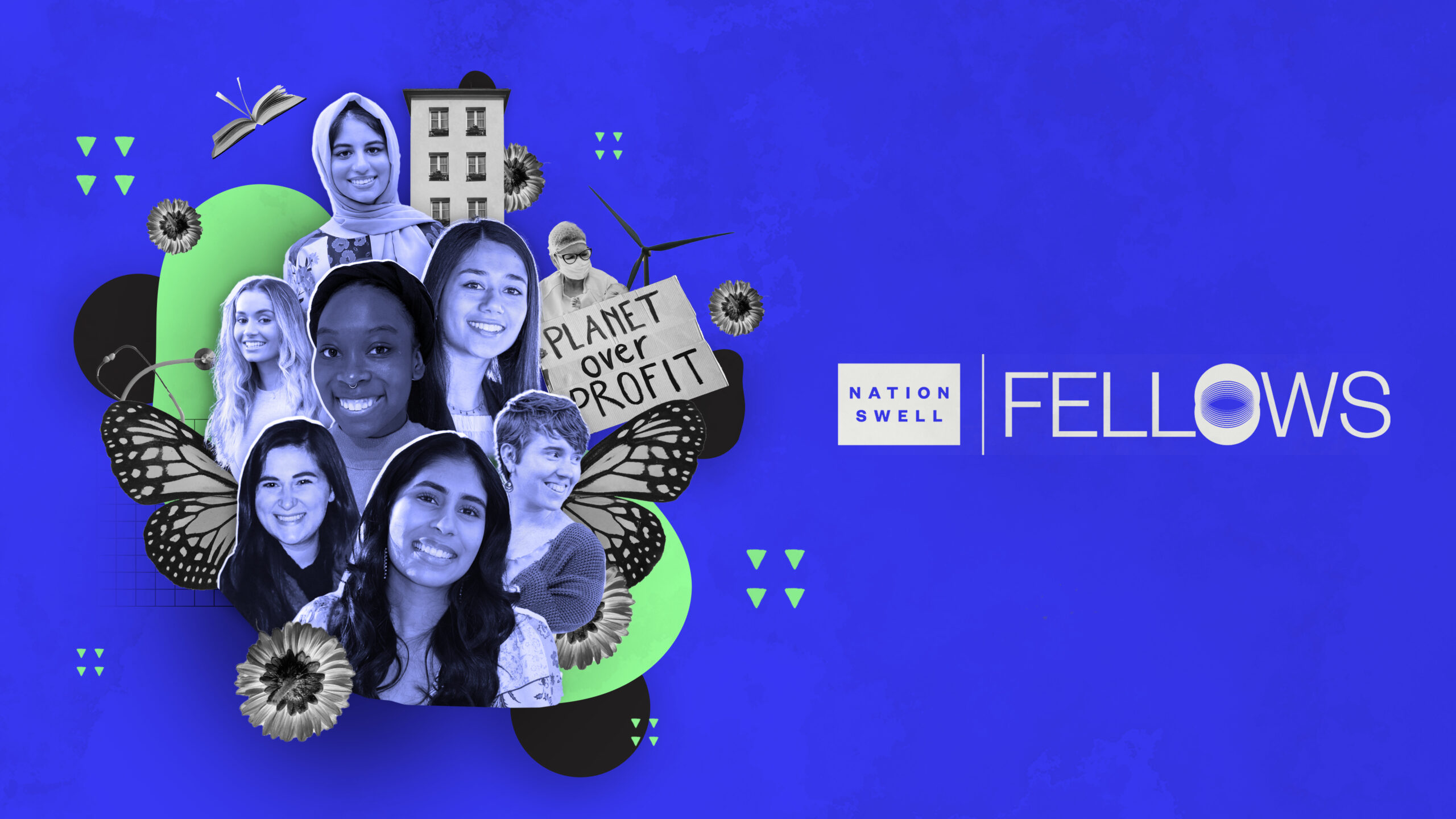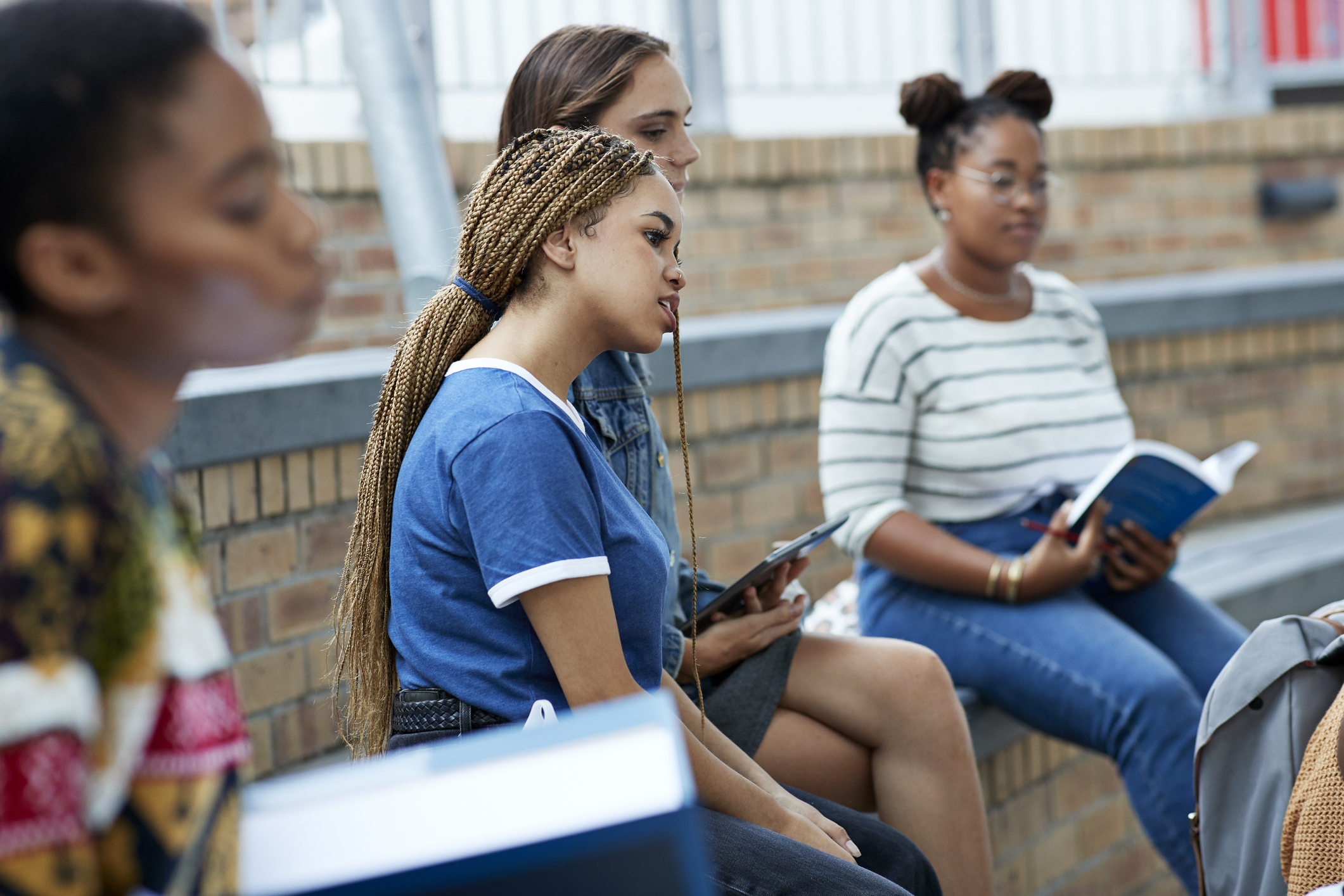With support from the American Family Insurance Institute for Corporate and Social Impact, NationSwell Fellowships provide the network, support, and knowledge to help young leaders level up their environmental and social impact. Over the course of ten months, NationSwell Fellows will work to refine an individual social impact project, connect with established leaders in their field, build upon their expertise of environmental and social issues, and co-design the program in its inaugural year.
In this series, NationSwell is profiling the incredible and inspiring recipients of this fellowship. Each of these young leaders stood out for their immense passion in their environmental and social issue areas of focus, demonstration of leadership in the field, and focus on the importance of intersectionality. As social impact trailblazers, they work on a range of issue areas including climate justice, healthcare access, disability rights in the workplace, racial justice, and more.
In this installment, we’re interviewing Sarah Miller, a youth climate activist whose work focuses on climate community preparedness, building resilience, investing in placemaking, and empowering and uplifting our most vulnerable neighbors.
NationSwell: Tell us about your journey to social impact and sustainability work. What was the moment you knew you wanted to devote your professional life to what you’re doing now?
Sarah Miller: My work and passion lie at the intersections of community and personal resilience, inclusive placemaking, and climate preparedness. I seek to continually explore how our communities, people, and planet can better prepare for impending climate, economic and social related challenges, while also seeking to empower and uplift our most vulnerable neighbors. Throughout this process of life, growing and learning, I have come to understand a circularity, common themes, universal truths about that which I’m passionate about, that which motivates me in my personal and professional life.
My work focuses on ensuring personal and community preparedness for the climate crisis, and its impacts on people, communities, and the planet. Growing up, I spent lots of time outdoors with loved ones, who taught and showed me the great beauty in the natural world, but also the strong need and desire to protect natural and sacred spaces for all people. The climate crisis disproportionately impacts marginalized communities, and communities living in or near poverty – making justice, and equity crucial components of this important work, so that those who contribute the least, don’t end up bearing a heavier weight or load.
Through my work, I’ve learned that belonging is an inherent, necessary, and vital component of livable, vibrant, and equitable communities. Communities have been built on centuries of systemic oppression, leading to unequal health, community, and personal outcomes. Investing in — and being intentional about — placemaking and addressing centuries long disadvantages built into our communities is how our cities and communities can be made more livable, safe, healthy, and equitable for all people within their geographies.
Cultivating and maintaining personal longevity and fortitude in social impact work is necessary for movement building and forward progress. Social impact and climate work can bear substantial emotional and spiritual weight for those engaging in the work. Self-care, mindfulness, and strengthening personal toolkits for dealing with the substantial weight and burden — that ultimately leads to burnout — from engaging in this meaningful work, is necessary for personal resilience.
NationSwell: What are some of the ways this fellowship has been able to support your work? What have you gotten out of it, and has anything surprised you along the way?
Miller: Identifying and cultivating my deepest passions has taken some time. It takes experience, trial and error, and adventure and spontaneity to discover and rediscover what aligns with one’s soul, inner fire, and dharma — or universal truth — inherent to one’s soul. Growing up, I spent a lot of time outside, camping, hiking, in national parks, and grew incredibly passionate about ensuring sustainability of our natural resources and places for future generations to come.
During my time at Indiana University, I explored community development, sustainable food systems, inclusive placemaking and climate action topics extensively, loving the universality of how interconnected these topics truly are. Post-graduation, I had the opportunity to explore climate workforce development and climate action across the State of Indiana, and wanted to intentionally explore why climate change adaptation and resilience weren’t being talked about in tandem with poverty alleviation and social impact work across the state.
This has led me to explore both poverty alleviation, social impact and climate adaptation work in my current position at a regional Indiana United Way — coordinating various programs geared towards supporting the network of human services organizations that our United Way serves. Here, I launched and direct a green and sustainability affinity group for the organization that works to tackle community challenges like poverty alleviation and climate adaptation more holistically – engaging with local stakeholders and organizations for “Lunch and Learns”, and fostering awareness for our team of our environmental and social impact at work and in our communities.
For the last 6 years, I have also developed a passion for yoga. Over the years, it has been a wonderful and intentional way to reduce stress, feelings of burnout and anxiety associated with the heaviness of this field, and also cultivate my personal voice and power. My relationship to my practice over the last three years has really cultivated my deep desire and passion for mindfulness, stress relief and burnout reduction practices not only for myself, but for others in this field who might be prone to burnout or compassion fatigue. Currently enrolled in a 200-hour yoga teacher training, I am excited to take the skills in stress relief, mindfulness, and connection between mind, body, and breath on the yoga mat, to the world of social impact and climate action, helping others in these spaces to build personal fortitude and longevity in this work.
I am incredibly passionate about how these truths intersect and weave through communities. I am excited to continue to explore how the intersections of these ideas can create the futures and realities that we want for ourselves, communities, and the planet.
NationSwell: What’s the focus of your work right now? And what’s next for you?
Miller: Through the support of this fellowship, I have been able to: launch and develop specific and tangential strategy for a “Green Team” at my organization. Connecting with the NationSwell ecosystem of social impact leaders and partners has led to overwhelming support in helping me navigate developing a group like this, navigate cultivating team member engagement with the group and the initiatives, help develop strategy for our Lunch and Learn series, and help build upon the sustained momentum and energy we are gaining here.
Through the NationSwell ecosystem, I have also had tremendous support and feedback for a sustainability recommendation for my organization, in which industry experts gave me best practices suggestions from lived experience and expertise.
I am in the middle of writing an opinion piece, where I am excited to share my thoughts on the power of youth voice and leadership, organizational culture and belongness, and the need for social impact work to be dynamic and intersectional. I am also engaging in a 90-day writing challenge through the Fellowship, which has helped me to rediscover my own creativity, inner voice and passion for the work I am engaging in.
The cohort full of strong and passionate youth womxn leaders has also been such a joy and honor to be a part of. These womxn are doing extraordinary things, affecting positive change on the world, and it has been so meaningful and impactful to feel the support and work alongside these people.
The NationSwell Fellowship has been so impactful for helping me to finalize and rediscover my short and long-term goals. Developing effective communication around the climate crisis, it’s impacts on marginalized communities, and the need for mindfulness and stress reduction in this field, is something that I have grow so passionate about, and with support of the NationSwell Fellowship program, I have been able to dive into these topics, and further sharpen my own unique voice in these spaces. I have always wanted to publish an opinion piece, and I am so thrilled that I have the opportunity through this program.
NationSwell: How can NationSwell’s ecosystem of social impact leaders and partners help you with your short term and long term goals?
My goal for this fellowship was to develop my own personal toolkit for talking about, understanding, and acting on climate adaptation and poverty alleviation work within a Midwestern city context. I have successfully developed a toolkit and have even started actual strategy development and implementation of the things I have been learning throughout this Fellowship. My work with the Green/Sustainability affinity group at my organization, and being able to bring together lots of organizations in the Greater Indianapolis area to talk about our varying work, our missions, and how we all are ultimately trying to make Indiana a more livable, equitable, and sustainable place has been so impactful to see.
The overwhelmingly positive response from my colleagues about the work I am fostering and engaging in also shows me that people in the Midwest are dying for more intersectionality of topics. We want to talk about community challenges in tandem, and break down siloes around these community challenges.
With my yoga studies over the next couple months, I really hope to continue to find meaningful ways to bring stress reduction, eco-anxiety, compassion fatigue into these conversations. We need continued and sustained efforts from those in social impact and climate work, which requires true rootedness, and grounding in the world around them, and in themselves. Yoga, meditation, and mindfulness can be one part of the personal resilience toolkit, to help those working in these spaces. I also hope to continue to build out my written and verbal communications, so I can reach larger audiences of folx working on these issues in communities around the Midwest.
To learn more about the NationSwell Fellows program, visit our fellowship hub.








